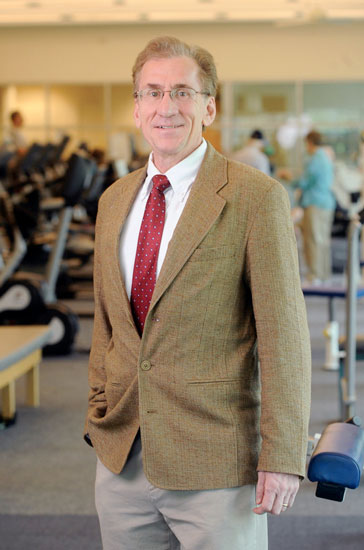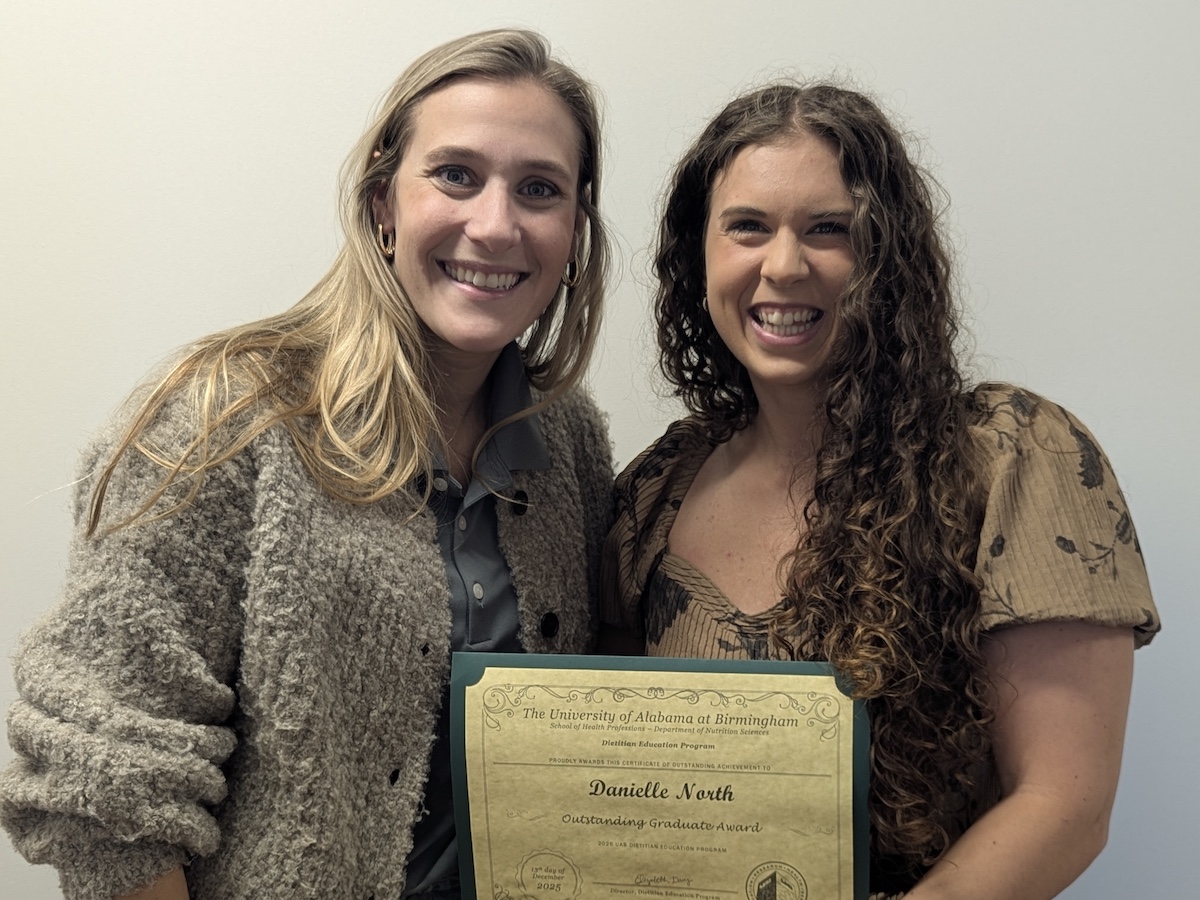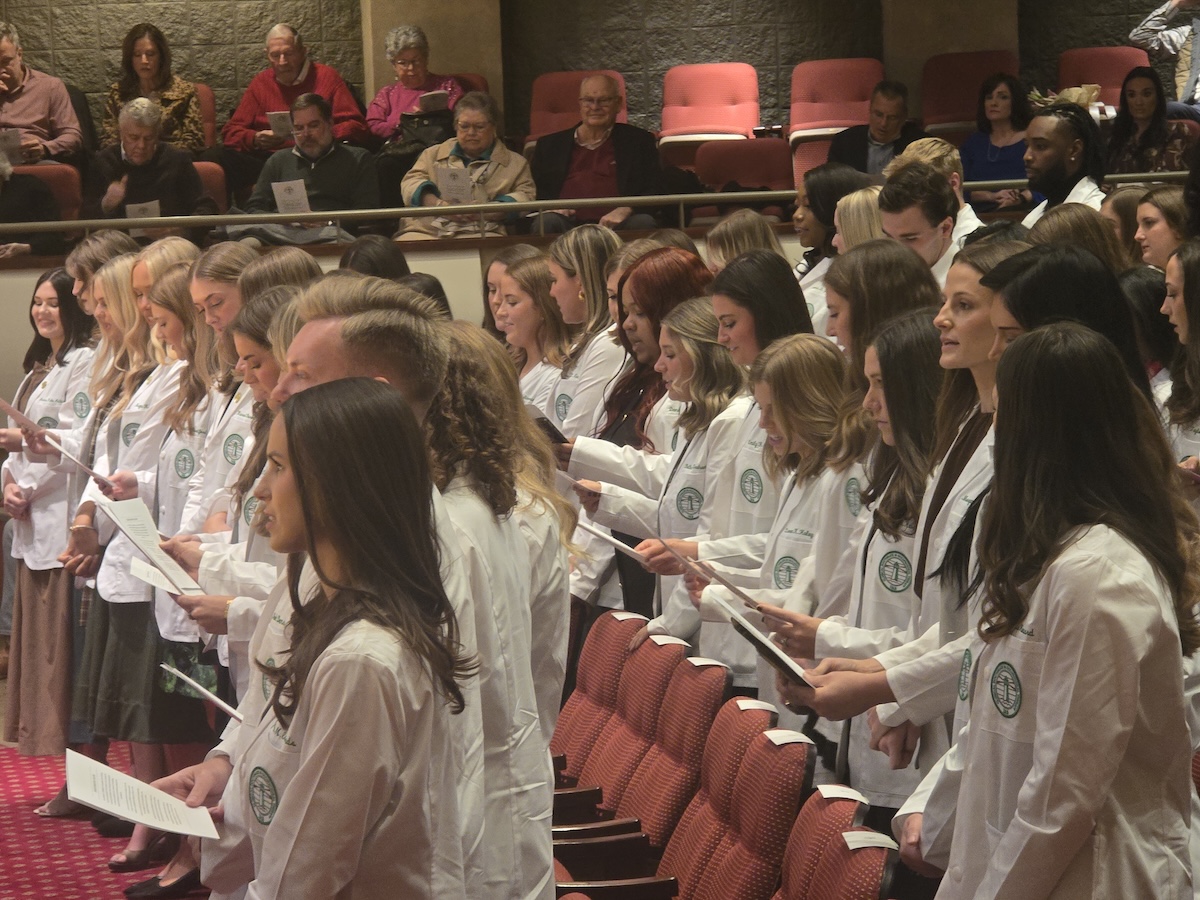 James Rimmer, Ph.D.The Patient-Centered Outcomes Research Institute (PCORI) Board of Governors has approved a $5.8 million grant over the next four years to the University of Alabama at Birmingham School of Health Professions’ James Rimmer, Ph.D., to fund a study to determine whether people with multiple sclerosis get as much benefit from an exercise-based rehabilitation program delivered via internet and telephone as they do when the therapy is provided in a clinic.
James Rimmer, Ph.D.The Patient-Centered Outcomes Research Institute (PCORI) Board of Governors has approved a $5.8 million grant over the next four years to the University of Alabama at Birmingham School of Health Professions’ James Rimmer, Ph.D., to fund a study to determine whether people with multiple sclerosis get as much benefit from an exercise-based rehabilitation program delivered via internet and telephone as they do when the therapy is provided in a clinic.
Rimmer, who is director of the UAB / Lakeshore Research Collaborative, where the study is headquartered, and Lakeshore Foundation Endowed Chair in Health Promotion and Rehabilitation Sciences at the UAB School of Health Professions, is a pioneer in exercise and disability research, and was recently awarded more than $10 million for research in this area by the National Institutes of Health and the Centers for Disease Control and Prevention.
The PCORI project is the first major grant that focuses specifically on the MS community for Rimmer, who has personally been touched by MS through his niece’s living with the condition for the last 20 years in New York City.
“Dr. Rimmer’s projects should provide important evidence for the best ways to address troubling symptoms like fatigue, and the potential for using technology to deliver needed rehabilitation approaches to people in remote areas,” said Bruce Bebo, Ph.D., executive vice president, Research, National Multiple Sclerosis Society.
“Our telehealth framework is enabled to work under complete absence of internet connectivity, so this project moves the field of telerehabilitation beyond its current limitations,” said Mohan Thirumalai, Ph.D., director of Information and Communication Technologies, UAB / Lakeshore Research Collaborative. “The internet is not necessary because of preloading content, enabling offline data (usage pattern) collection and pairing with interactive voice response technology. This enables us to recruit participants all across Alabama and Mississippi, irrespective of their internet availability.”
Since meeting Rimmer, Tapan Mehta, Ph.D., assistant professor, UAB Department of Health Services Administration, had been looking specifically at PCORI opportunities for collaboration. Shortly thereafter, he saw a group of new PCORI-funded studies that address evidence gaps and questions that people with MS and other health care stakeholders identified as their top priorities through PCORI’s process for topic selection.
| “As a health service researcher and biostatistician, I am interested in evaluating telerehabilitation through a large pragmatic trial to better understand for whom and to what extent telerehabilitation would be effective in improving health and function in real-world and diverse settings for people with MS.” |
“We have the ability to conduct well-designed and rigorous, clinically meaningful telerehabilitation research in pragmatic settings, and generate evidence that can help inform payers and policymakers about providing coverage and access to telerehabilitation,” Mehta said. “As a health service researcher and biostatistician, I am interested in evaluating telerehabilitation through a large pragmatic trial to better understand for whom and to what extent telerehabilitation would be effective in improving health and function in real-world and diverse settings for people with MS.”
For this new PCORI project, the research team will work extensively with Emily Sherrill Riser, M.D., adjunct faculty member in the UAB Department of Physical Therapy. Riser, who is also on the faculty in the UAB Department of Neurology, is one of the pre-eminent neurologists in Alabama, a leading expert on aggressive treatment and management of MS, and the medical director of the Tanner Center for MS in Birmingham.
With more than 30 years’ experience, Riser knows that clinics that can provide rehabilitation services are scarce in rural and low-income areas. She says the team’s mindfulness has driven the project, and that is why the trial will be conducted with MS patients in communities across Alabama and Mississippi.
“We are reaching out to people in rural areas with limited or no access to health care or technology because they face more barriers to quality care than most,” Riser said. “We are going to test whether the traditional model of rehabilitation or the in-home telerehabilitation model is better, and if telehealth works the way we believe it will, then we are creating something that is going to be a game-changer for their lives.”
Robert Motl, Ph.D., professor in the Department of Physical Therapy and an international expert in exercise and MS, joined the UAB team last summer from the University of Illinois at Urbana-Champaign and will play a lead role on the project.
“This study will provide the strongest evidence to date on the effectiveness of exercise-based rehabilitation for restoring function and improving symptoms in people with MS, and the possibility of delivering these programs through telerehabilitation opens up the opportunity for changing the lives of all people with MS,” Motl said. “If successful, this is a game-changer.”
Dori Pekmezi, Ph.D., clinical psychologist and associate professor in the Department of Health Behavior, played a key role by recommending the use of interactive voice response systems to support the intervention.
|
“These studies will provide significant new evidence to help patients, their families and their clinicians decide more confidently which of the therapies available to them will work best given their needs and preferences.” —PCORI Executive Director Joe Selby, M.D., MPH. |
“Stakeholders emphasized that MS symptoms, such as fatigue, low endurance and pain, make it challenging for participants to adhere to the treatment protocol, and that specific strategies will be required to help keep them engaged,” Pekmezi said. “Based on this feedback, regular motivational contacts and accountability will be provided through an interactive voice response system and grounded in social cognitive theory, which has been used successfully in past studies to improve exercise.”
Tracy Tracy, O.T., is the clinical project coordinator and responsible for recruiting 820 people to be part of this MS research project. She believes it is the largest rehabilitation MS study ever in this area of science. In addition to the number of participants, the research also involves 65 clinicians from 30 clinical sites across the two states.
“The project works directly with therapists to treat MS because there is such a variety of symptoms associated with the disease that many of them are nervous they will make a mistake or miss what we call ‘invisible symptoms,’” said Tracy, who also works at the Tanner Center for MS with Riser. “This project is a win-win for everyone involved because it goes beyond research and beyond people with MS — it really works to help everyone receive and deliver quality care even after the project is completed.”
“These studies will provide significant new evidence to help patients, their families and their clinicians decide more confidently which of the therapies available to them will work best given their needs and preferences,” said PCORI Executive Director Joe Selby, M.D., MPH.
Rimmer says the time has come to meet the needs of an under-resourced community of people living with MS in Alabama and Mississippi. “If we can demonstrate that we can have an impact in two greatly underserved states, it will serve as a benchmark for the nation.”

